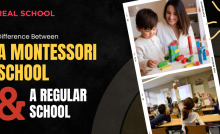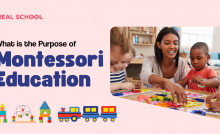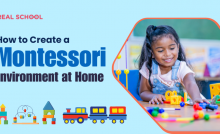Montessori Education: The Impact on Cognitive Development


Montessori education is renowned for its holistic approach to child development, which includes a strong emphasis on cognitive development. Dr. Maria Montessori designed a unique educational method that fosters intellectual growth and critical thinking in children. In this article, we will explore the impact of Montessori education on cognitive development and the ways in which it nurtures young minds.
Hands-On Learning
One of the cornerstones of Montessori education is hands-on learning. Montessori classrooms are equipped with a wide range of learning materials that engage children in concrete experiences. Through manipulation and exploration, children grasp abstract concepts in a tangible way. This hands-on approach ignites their curiosity and helps build a strong foundation of knowledge.
Development of Executive Functions
Montessori education promotes the development of executive functions—such as problem-solving, decision-making, and self-regulation. The freedom within limits approach allows children to make choices, set goals, and plan their learning activities. This fosters the development of executive functions, which are essential for academic success and lifelong learning.
Intrinsic Motivation
Montessori classrooms focus on intrinsic motivation, wherein children are driven by their internal interests and curiosity rather than external rewards. This approach encourages a genuine love for learning and a desire to explore new ideas independently. Intrinsic motivation nurtures children’s passion for acquiring knowledge, leading to sustained and meaningful cognitive development.
Multi-Sensory Learning
Montessori education capitalizes on multi-sensory learning experiences. The learning materials appeal to multiple senses, enabling children to engage with information through sight, touch, and sound. Multi-sensory learning enhances memory retention and deepens understanding by allowing children to process information in different ways.
Individualized Learning Pace
In Montessori classrooms, children are free to work at their own pace. This individualized learning approach ensures that children have sufficient time to master concepts and move on to new challenges when they are ready. Individualized learning fosters a deeper understanding of subject matter and prevents the development of learning gaps.
Language and Literacy Development
Montessori education places significant importance on language and literacy development. Montessori materials, such as the Movable Alphabet and Sandpaper Letters, facilitate the exploration of language and reading skills. Children engage in activities that develop vocabulary, phonics, and reading comprehension, laying a strong foundation for language development.
Mathematical Thinking
Mathematics is another area where Montessori education excels. Through the use of concrete materials like Number Rods, Bead Bars, and Golden Beads, children explore mathematical concepts in a visual and tangible manner. Montessori education nurtures a deep understanding of mathematical principles and fosters a love for problem-solving.
Critical Thinking and Creativity
Montessori education encourages critical thinking and creativity. Children are given the freedom to explore and find solutions to problems independently. They are encouraged to ask questions, make connections, and think critically about the world around them. This approach sparks creativity and instills a sense of curiosity that fuels cognitive development.
Cognitive Preparedness for the Future
The cognitive preparedness fostered in Montessori education extends beyond childhood. The strong foundation of critical thinking, problem-solving, and self-directed learning equips children with skills that serve them well throughout their educational journey and beyond, preparing them to navigate future challenges with confidence.
Conclusion
Montessori education has a profound impact on cognitive development by promoting hands-on learning, fostering executive functions, and nurturing intrinsic motivation. The multi-sensory approach, individualized learning pace, and emphasis on language and mathematical thinking further enrich children’s cognitive growth. By cultivating critical thinking, creativity, and cognitive preparedness for the future, Montessori education empowers children to become lifelong learners and confident thinkers.
FAQs (Frequently Asked Questions)
How does Montessori education support the development of problem-solving skills in children?
Can Montessori education be adapted for children with learning differences or special needs?
How do Montessori materials facilitate multi-sensory learning experiences?
What role do teachers play in fostering cognitive development in Montessori classrooms?
How does Montessori education benefit children’s cognitive development compared to traditional educational approaches?
Recent Posts
What are the Advantages of Online Teaching at The Real School?
In the article -"What are the Advantages of Online Teaching at The Real School?" we…
What is the Full Form of School?: Unveiling the Acronym
The term "school" carries profound significance in the realm of education, representing more than just…
What is Math Full Form?: Cracking the Code
Mathematics, often referred to as "Math," is a subject that elicits various reactions from students…
What is Full Form of Homework?: Decoding Academics
Homework, an integral part of the academic journey, often raises questions about its purpose and…
What is Full Form of Teacher?: Demystifying Education
In the intricate tapestry of education, teachers stand as the pillars shaping the intellectual and…
What is Real Education?: Discovering Its Essence and Impact
The concept of real education is evolving, transcending traditional views that equate it solely with…


